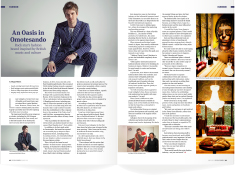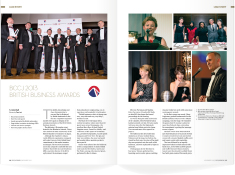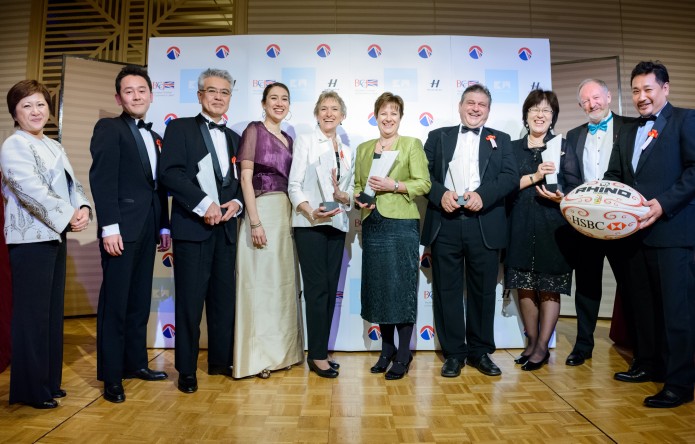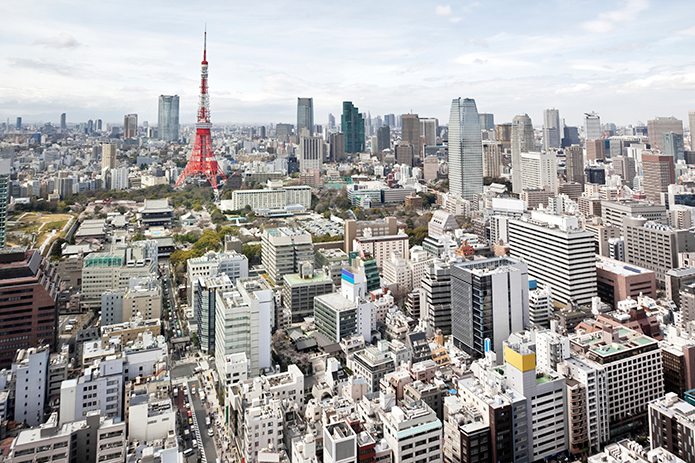Please enjoy our 50th issue

UK–Japan links and collaborations are of great interest to readers, like this rock star’s British-inspired fashion brand, featured in the June 2013 issue.
Fifty issues is quite a landmark for any monthly magazine to achieve; even more so when the production of those issues coincides with a time of great economic uncertainty, the aftermath of the nation’s worst natural disaster in living memory, increased competition and the broader trend towards an entirely online world of information.
But, ever since its inaugural edition, which came out in December 2009, BCCJ ACUMEN has done more than any other publication to provide insight into all aspects of Anglo-Japanese business, culture and lifestyle, as well as to inform, entertain, provoke and amuse.
“It had been a few years since we had stopped producing a BCCJ magazine; the feeling was that we should simply be online”, said Ian de Stains OBE, former executive director of the British Chamber of Commerce in Japan (BCCJ) and part of the committee set up to choose the best contender to start a magazine again.
“But I missed having a printed publication as did many members—and I was thrilled that [ACUMEN] was clearly a fine product”, enthused de Stains, now executive director of TELL, a not-for-profit organisation that provides counselling services to Japan’s international community (see page 45).
The magazine is so impressive that other chambers have cast admiring glances in ACUMEN’s direction, according to Phil Gibb OBE of Canning Professional K.K.
“In my time as BCCJ president, I received many favourable comments about BCCJ ACUMEN”, he said. “These were from members but, more interestingly, from colleagues in other chambers of commerce in Japan.
“Quality and relevance were two of the most often heard comments”, added Gibb, who was also part of the team that entrusted Custom Media with meeting the chamber’s commitment to quality and professionalism. “In addition, look, feel and content made it stand out from comparable magazines”.
Given that Custom Media was a relative unknown back in 2009, the chamber’s decision was a brave one, but one that has paid off.
“My first time reading ACUMEN, I remember being taken aback at finding a chamber publication that actually contained articles I was genuinely interested in reading—articles I would pick out from any news source and choose to read”, said Nick Walters, a former president of the chamber and executive officer and vice-president controller Japan for MetLife, Inc.
“This revelation struck on my first read and I was regularly reminded of the feeling whenever reading subsequent issues”, he added. “[It] was down to the range of articles, as well as the quality of the writers”.
For many regular readers, certain front covers stand out in the memory. For some, it was the magazine’s coverage of the chamber’s efforts to assist the people affected by the Great East Japan Earthquake of March 2011; others pointed to the impressive sight of high-performance British cars, the Eurofighter Typhoon or HMS Daring moored in Tokyo Bay.
One cover shot appeared to polarise opinions, although the vast majority of readers applauded the decision to put Maya Nakanishi front and centre—artistically—as she sought to raise enough cash to enable her to compete at the London 2012 Paralympic Games.
“This [cover] sticks out for a couple of reasons: because it was the first— and probably only—cover on which we grey-scaled the BCCJ logo”, said Executive Director Lori Henderson. “It stood out because we added pink accents and because there was a naked person on the cover—a female person with disabilities at that.
“We subsequently received lots of comments from people, members and non-members alike, who praised the boldness of the piece”, she added. “I think that cover was rather ahead of its time for Japan, and chamber publications everywhere”.
David Bickle, president of the chamber, echoed support for that bravery—on the part of both Nakanishi and ACUMEN—saying it shows the struggles of disabled athletes, and demonstrates “an editorial boldness to present content that is not only informative, but also thought-provoking”.
“The chamber is proud to have a magazine that strives to stimulate discussion, debate and exchange, both within and beyond its pages, and that has the confidence and maturity to openly share criticism, along with praise, of its content with readers”, he said.
ACUMEN provides the chamber with “a powerful channel through which we can engage and share information with members, and assist in the promotion of British business and commercial interests to a wider audience”, he added.
The publisher is very aware, however, that the title cannot afford to rest on its laurels and is constantly seeking ways in which to enhance the magazine. In March 2014 the magazine underwent a redesign that Henderson believes gives it “the look and feel that could rival any international publication”.
De Stains agrees: “The recent design make-over was very subtle, but refined even further what was already a sophisticated publication.
“Editorially, there is a sense of more confidence and a clearer focus”, he said. “I know from personal experience that the standards expected of contributors are very high and the editors are meticulous in their work”.
Alison Jambert, former president of the chamber and communications director of Eat Creative K.K., describes the magazine as “refreshing” and a positive reflection of the chamber’s activities. It serves as “a strong communications vehicle for reinforcing [the BCCJ’s] vision and mission, and therefore is a showcase for potential new members”.
Jambert would, however, like to see more in-depth features addressing the wider issues of doing business in Japan, while Henderson wants “even more photos” and behind-the-scenes features about executives and Japanese corporate leaders.
Walters summed up perhaps one of the key assets that ACUMEN provides for the chamber.
“A final thought is the pride I always feel whenever I am settling down in the Sakura Lounge at Narita airport and see the multiple copies of ACUMEN standing on the magazine rack, alongside The Economist and The Times, and note ‘our’ publication does not just look at home among these distinguished titles, but actually looks rather grand”.
“Its quality is not just in the content, but in the physical feel and visual impact—but then again, maybe I’m a bit biased”.
Brands
From cars to fashion, banking, cuisine, medicine and countless other sectors, Britain has some of the biggest and best-known brand names in the world. Many of them have a solid foot in the door of the Japanese market.
Jaguar Land Rover Japan Ltd., for example, has built a reputation for quality and British workmanship, and has high hopes for its latest launch here, the F-TYPE coupé.
“One of the expectations or ‘must-have’ attributes of a luxury brand in Japan is that sense of a rich heritage”, the firm told ACUMEN in 2011 as part of a feature on the carmaker. “The Japanese audience really looks for a brand that builds on that sense of heritage and which Japanese car brands just don’t have.
“Japanese carmakers are good at the practical elements that go into a car, but anyone intending to buy a luxury car expects more than just the practical. They want the unique, the addition to their lifestyle, a fashion statement”.
Business has been brisk for another motor firm, which produces some of the most iconic works of two-wheeled engineering on the road: Triumph Motorcycles.
“This is a 110-year-old brand that has been devoted to making motorcycles”, said Triumph Motorcycles Japan.
“It starts there, with the history, the legend, the nostalgia, the fame, the glory”, the maker said. “It’s the emotional fuel. An association with events, success and people; and it evolves into a range of high-tech, modern machines that evoke the heritage”.
In an interview in 2012, the firm bemoaned the fact that there are fewer motorbikes on Japan’s roads than in years gone by, but said Triumph has a range of vehicles to meet all tastes as soon as interest is revived.
“People want alternatives and they want to be different and Triumph offers them a real choice”.
Another firm that is going places is British Airways, which opened a new service between London Heathrow Airport and Tokyo Haneda International Airport in February 2011.
British Airways became the first European carrier to operate out of the Haneda airport, offering five flights a week aboard a Boeing 777-200.
“We are constantly working to improve our performance and offer better services to our customers”, the firm told ACUMEN. “We take pride in anticipating our customers’ needs and introducing products before customers realise there is a need for them”.
Innovation is also the cornerstone of GlaxoSmithKline plc’s operations in Japan, nearly 300 years after its forerunner opened in London.
“Our brand is extremely important to us because it represents who we are and what we do as a company”, said a GSK K.K. spokesperson. “In order to build trust with society, all employees are aligned with our company values of transparency, respect for people and integrity, and we are patient-focused in our internal and external engagement.
“New medicines and healthcare products are needed by people across the globe to address the many illnesses that are still not well-controlled or treated. At the same time, scientific research is continuously uncovering new understandings about disease processes and technologies.
“These two elements present us with the opportunity to investigate and develop new and improved treatments”, the global healthcare firm told ACUMEN in an interview in 2012. “We create value by applying science and technology to discover, develop, produce and distribute medicines, vaccines and consumer healthcare products”.

The May 2014 ACUMEN features the market potential for British food and drink firms, and their success at Foodex 2014.
Equally committed to exceeding the expectations of consumers in this very exacting market is Unilever, which was founded in 1884 by Lord William Hesketh Lever.
“The vision that Lord Lever had for the company was to produce high-quality products at affordable prices. It allowed people on limited incomes to have a level of hygiene that would prevent ill health”, said a spokesperson of Unilever.
“And that attitude is still with us to this day; we offer a range of quality products at different price points, each offering different consumer benefits across the world.
“On any given day, 2bn people in 170 countries around the world use Unilever products”, he added. “Of that total, 12mn are in Japan. This gives us a unique opportunity to help improve their everyday lives and, through hygiene and nutrition, make a positive impact on the planet.
“Our ambition is to double the size of our business while reducing our overall environmental impact across the entire value chain. We believe that is best achieved through our brands, which have to say something meaningful to the consumers”.
The Royal Bank of Scotland is a relative newcomer to the Japanese market but, since 2001, has built on its core strengths in international debt financing, transaction services and risk management, which the firm said helps the bank to maintain its global market-leading position.
“Throughout our global network, we raise capital for companies; we manage risks; and we move money through our transaction services”, a spokesperson told ACUMEN. “If you’re a bank or a securities company, those are your three key areas and we are typically in the top five in the global league tables in all three categories.
“That is important for what it says about the clients”, he pointed out. “They choose to bank with RBS, which is what has put us into these leading positions. The score card shows how well we are serving our clients’ needs”.
Another great UK brand that we must raise a toast to is Berry Bros & Rudd, the oldest wine and spirit merchant in Britain.
“We’re doing well in Japan now, even though it’s a complicated market for us”, the firm said. “But little by little, we’re understanding it better and we have a great 17-strong team here so I’m very pleased with the way in which we are growing.
“There is still a long way to go in Japan and even though we have been here for 20 years, you must remember that we’re working from a history that goes back more than 300 years”.
How ACUMEN began
A magazine that was initially put together in the apartment of one of the founding partners in Kawasaki-shi has—in the space of 50 issues—evolved into the most authoritative and insightful title in the crowded Tokyo business publication market, as well as a whole lot more.
“Our original plan was simply to publish an authoritative, business-only publication for BCCJ members”, said Simon Farrell, one of the founders and current publisher of Custom Media K.K.
“But as interest grew and ideas and support flooded in from writers, members and others, ACUMEN quietly evolved into a magazine for the entire British community in Japan, as our focus shifted to also showcase other elements of British lifestyle”.
That was in part fuelled by distribution widening from the original target of a narrow initial membership base, to a far wider array of outlets. ACUMEN can now be picked up in several airport departure lounges in the UK, Hong Kong and Japan, and is delivered to selected central Tokyo subscribers of the Financial Times.
Today, the magazine has a readership of more than 60,000 for every issue. The firm regularly receives requests for extra copies and believes the publication is on the right track.
“One of the nicest comments I have had was from then-British Ambassador to Japan Sir David Warren KCMG, who told me he had been very pleasantly surprised to see ACUMEN at a Heathrow airport departure lounge and was so glad for some good reading on the way back to Tokyo”, Farrell said.
It was not always plain sailing, however.
“We launched at a time when the global economy was reeling from the Lehman Brothers bankruptcy and most marketing budgets were tight or non-existent”, said President Robert Heldt. “So, we took the pragmatic approach of publishing it every two months before building the brand and distribution, then going monthly the next year”.
Custom Media also had to convince BCCJ members and potential advertisers that it was here for the long run, and that the quality of the magazine would not decline. There were also a couple of run-ins with firms who thought they could take advantage of a start-up, but that is no longer an issue.
The key now, the firm says, is to continue to build on the title’s reputation.
“We take the time to listen to our readership, interact and engage with them on a regular basis to understand what they would like to read and constantly improve the quality of the content and product”, said Heldt.
“Unlike similar publications in the market that have not freshened their look and feel since launching, in the four years that ACUMEN has been around, we have completely redesigned twice and are constantly tweaking the magazine”.
One of the greatest compliments Heldt said he has ever received was when a design expert and academic said he loved the most recent redesign.
“You ask the questions I wish more organisations would ask: How can this product look, feel and read better?” the reader said. “It’s kaizen and ‘if it isn’t broke, break it’ at its best. You had a very good publication; your willingness to examine and redo the design is making it a great one”.
The company is now in the process of redesigning ACUMEN’s web presence and upgrading the digital version to make it available on the Apple iTunes store.
“We believe the print version will remain as an important medium, but our digital version will help us reach a far wider audience beyond Japan”, Heldt said.
The mission remains the same, however: to make the next edition better than the previous one, and to provide members and other readers with insightful business features, mixed with engaging and entertaining stories about the UK’s place in the artistic, situational, cultural and sporting life of Japan.
Over the years, there have been some memorable tales.
The exclusive interview with Michael Woodford MBE in September 2011 came out just days before Olympus Corporation sacked him as president, with media around the world picking out the “juicy bits” from the story, Farrell said.
“My personal favourites are the 2012 cover stories on round-the-world solo rower Sarah Outen, in May (as well as our coverage of her progress), and paralympic athlete Maya Nakanishi, in June”, he added. “It was great fun tracking Sarah as she left Tower Bridge and reached Japan, stayed a while, then rowed off again.
“And dear Maya, who has a prosthetic leg, bravely stripped to her birthday suit for a saucy calendar—and our front page—to fund her dream trip of competing at the London Olympics”.
Farrell says that he is fortunate to be surrounded by a talented team, but admits to fears in the early days of the publication.
“I did worry that one day we would run out of ideas and people to feature”, he said. “But the opposite has been true: we have a long list of UK-related articles not yet published and new ideas coming in regularly from writers, BCCJ members and others.
“Publishing ACUMEN has unexpectedly opened my eyes to the vast amount of great work—paid and volunteer—that British people are doing in Japan”.

Acumen plays a key role in promoting and featuring the British Business Awards every year, as seen in the November 2013 issue.
First edition and British Business Awards
Fittingly, the very first issue of BCCJ ACUMEN featured the 2009 British Business Awards as its cover story. In the intervening years, the awards have grown in prestige and the presentation ceremony has expanded into a major event on the calendar for firms and organisations here.
Similarly, ACUMEN has evolved and developed dramatically since December 2009. The inaugural edition squeezed in events spanning two months and the magazine became a monthly publication just one year later. It is hoped it has become an important partner for the chamber and the British business community here.
In his opening foreword for the first edition, former British Ambassador Sir David Warren KCMG said that, while the “Lehman shock” had made 2008 and 2009 “a difficult year”, he was immensely positive about the future.
“As ambassador, I am privileged to see just how broad the UK–Japan relationship is, and how many opportunities there are to use those links to further our corporate objectives”, he said.
Farrell set out his vision for the title: to help British businesses establish a foothold here or increase an existing presence.
But the magazine does not concerm itself solely with business, he explained.
“The CEO of the Japan branch of a mid-sized British manufacturer told me recently that he wants to promote the British lifestyle here—because he likes it and it makes good business sense”.
That is the reason ACUMEN has covered everything from fighter aircraft to chocolatiers, from cricket to the property industry, from top-notch British cars to a cat café. And that is hardly scratching the surface of the topics that have been tackled over the past 50 issues.
The magazine appears to be getting it right.
At the 2013 British Business Awards, Custom Media emerged as the winner of the coveted Company of the Year Award.
The winner was selected from among some of the biggest and most successful names in British industry by a panel of judges who included Jon Harding, chief operating officer of UK Trade & Investment; Ernie Olsen, country executive, Royal Bank of Scotland Japan; and the former president and CEO of Olympus Corporation, Michael Woodford, who is arguably more famous as the world’s most celebrated corporate whistle-blower.
Accepting the award from Ambassador Tim Hitchens CMG LVO, Custom Media President Robert Heldt thanked the judges for “recognising small businesses and the role they play in today’s challenging business environment”.
Post-quake edition
It sometimes takes a crisis for the very best in individuals, organisations and corporations to shine through. And so it was in the case of the British community in the days and weeks after the Great East Japan Earthquake and Tsunami on March 11, 2011.
No one who experienced Japan’s worst natural disaster in living memory will forget where they were on the afternoon the ground began to shake violently. Equally, no one who witnessed the generosity and unflinching support with which Britons reacted will forget the spectacle of the donations.
ACUMEN attempted to keep up with all the good work that spontaneously poured forth.
GlaxoSmithKline K.K. immediately donated ¥200mn to the Japanese Red Cross Society for emergency supplies of water, food and drugs for a range of common illnesses. Unilever came forward with tons of soap, shampoo, toiletries and tea, while the firm matched donations from staff, many of whom were involved in ferrying supplies to emergency shelters.
Hays Specialist Recruitment Japan K.K. and The Robert Walters Group matched staff donations and launched fundraising drives, while the ANA InterContinental Tokyo donated noodles, rice, mineral water, blankets, towels, soap and other toiletries.
Pearson Kirihara K.K. reacted with 18 tonnes of supplies donated by employees’ families, 4.5 tonnes of rice and a pallet of nappies, while Jaguar Land Rover Japan provided vehicles for the government’s Rapid Response Team.
This support is merely a fraction of the assistance that was extended to people living in parts of north-east Japan that were most severely affected by the disaster.
The chamber was also swiftly in gear, with Lori Henderson—a mere six weeks in her role as executive director—and the rest of the team at the secretariat coordinating the response. The BCCJ offered a lifeline to British citizens and firms here, providing information and vital support.
Once the initial crisis had eased somewhat, the chamber put the Back to Business Initiative for Tohoku into operation, partnering with firms in the worst-hit areas to rebuild all that had been lost.
For her efforts, Henderson was awarded the MBE at Buckingham Palace in June 2012. Phil Gibb, who was president of the chamber at the time of the disaster, was awarded the OBE in May 2013 by the Prince of Wales for his services to British business in Japan, in part in the aftermath of the earthquake.
The embassy was also in the thick of the crisis from the beginning, with Ambassador David Warren KCMG visiting the affected areas to help locate British nationals caught up in the disaster and to get a better understanding of the scale of the problems.
For his efforts, Sir David was awarded the Knight Commander of the Order of St Michael and St George in the 2012 New Year Honours list.
Speaking to ACUMEN shortly before retiring from the diplomatic service and after four years serving as ambassador, Sir David said the rest of his work in Japan “pales into insignificance” in comparison with the earthquake-related efforts.
“It was an immensely distressing experience and none of us who went to the affected region soon after the disaster will ever forget the appalling devastation that we saw or the extraordinary courage and resilience of the people whose lives had been destroyed in this way”, he said.
Far from slipping from the minds of the British community here, Tohoku, and the people who still live with the aftermath of the disaster, remains important.
As recently as this spring, the Knights in White Lycra completed a 500km cycle from Tokyo to Minamisanriku, in Miyagi Prefecture for the non-profit organisation O.G.A for Aid. The ride raised more than ¥5mn to help construct a vegetable-processing factory in the town.
It is this sort of long-term assistance that communities in Tohoku require, and the British contingent in Japan is still busy extending that helping hand.
Thoughts from BCCJ excom members
“I particularly like the media and community sections because the news there reflects the broad variety and significant scale of UK–Japan partnership activities taking place throughout the year. The new, exciting and creative partnerships across industry, the arts and community activities continually remind me that there is no limit to the benefits of international collaboration”.
Anna Pinsky, BCCJ vice president
“I particularly enjoy the stories about British companies doing well in Japan, be it through sales or partnership—the essence of what the BCCJ stands for. The editor’s and BCCJ executive director’s columns are usually quite amusing. ACUMEN is, IMHO, the leading chamber magazine. Congratulations on reaching half a century!”
Richard Thornley, managing director of Bell Helicopter Co., Ltd.
“I particularly enjoy the success stories about British companies in the Japanese market. Japan is not an easy market for many businesses but regularly seeing ACUMEN articles about British companies succeeding sends out a positive message about the benefits that can be achieved”.
James Dodds, partner with KPMG Tax Corporation.
“I’m always fascinated by the success stories of British entrepreneurs on the Export To Japan page, which demonstrate how individuals and organisations of all sizes can develop and thrive in Japan”.
Jonty Brunner, regional commercial manager for Japan & Korea with British Airways
“My favourite section of the magazine is the top story of the edition, as it always has the most striking feature stories, but I also find useful information in the events section”.
Haruno Yoshida, president of BT Japan Corporation
“I always enjoy the stories of people from the UK living in Japan and doing really interesting things, often outside the main cities and business fields, and similar Japanese people in the UK. Both countries seem to accept (slightly crazy) people with dreams and passion, and are better off for it”.
Graham Davis, freelance writer and member of the BCCJ executive committee
“In recent years Japan has often taken a back seat to developing markets like China, India and Brazil. The news section reminds me that Japan remains an attractive market for a wide range of UK goods and services, particularly from often-interesting and innovative small and medium-size businesses”.
Iain Ferguson, president & chief operating officer, Lloyd’s Japan Inc.







